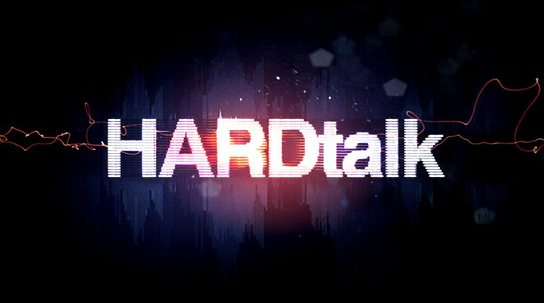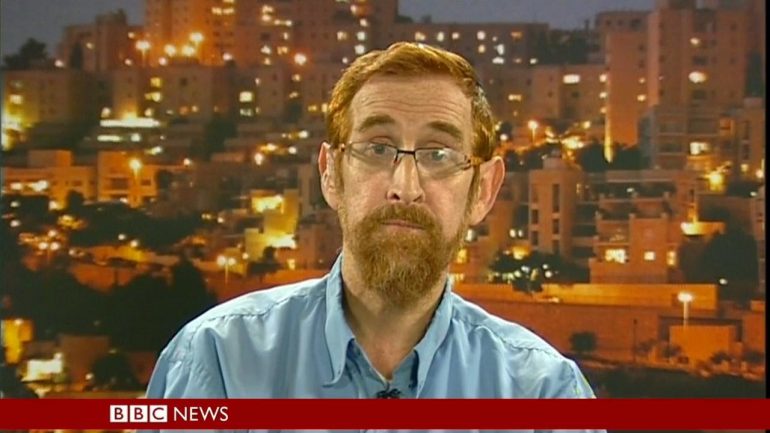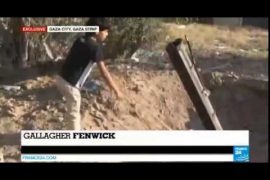The January 7th edition of ‘Hardtalk’ – presented by Stephen Sackur and broadcast on BBC World News and on the BBC News Channel with three additional repeats – featured an interview with Yehuda Glick. The synopsis to the programme appearing on the BBC website reads as follows:
“Jerusalem boasts one of the most bitterly contested pieces of real estate in the World – known as the Temple Mount to Jews and the Noble Sanctuary to Muslims. Jews aren’t allowed to pray there, many Jewish religious leaders say Jews should not set foot there; but that consensus is breaking down. Hardtalk speaks to Yehuda Glick an activist who’s been variously described as a dangerous extremist, and a campaigner for religious freedom. Three months ago he survived an assassination attempt. Why does he persist with his divisive campaign on Jerusalem’s holiest ground?”
The portrayal of the campaign for equal prayer rights for non-Muslims on Temple Mount as “divisive” is in tune with themes promoted in much of the BBC’s recent reporting from Israel. Indeed, that campaign was the second most promoted factor (after ‘settlements’) used by BBC journalists to ‘explain’ the rioting, violence and terror attacks in Jerusalem and elsewhere during October and November 2014. Whilst the BBC has seen fit to employ political labels such as “extremist” and “right-wing” to describe people involved in that campaign or visiting the site, similar political labelling for those engaged in rioting, violence and terror ostensibly in response to that campaign was absent from all BBC reporting.
Notably, no effort has been made by the BBC to date to examine the real issues behind opposition to equal prayer rights at a site holy to members of three religions. Whatever one’s opinion on the issue of the implementation of such rights (and the Israeli government has made it perfectly clear on numerous occasions that it has no intention of changing the status quo according to which non-Muslims are not allowed to pray at the site), there is clearly a wider discussion to be had about the acceptance of limits on freedom of religion in the 21st century and the ideologies which form the basis for violent opposition to equality for members of all faiths.
Stephen Sackur, however, passed up on the opportunity to use this interview to present a more in-depth view of the topic to BBC audiences and elected instead to further promote the standard BBC approach to the issue. As readers can see for themselves below, viewers of this edition of ‘Hardtalk’ were not even informed who tried to kill Yehuda Glick on October 29th and that would-be assassin was certainly not depicted as a “provocative figure” or an “extremist” – as Sackur did describe his interviewee. In fact at one point (05:50), Sackur’s unfortunate turn of phrase appears to justify violence.
Glick: “…there is no reason in the world why that [non-Muslims praying on Temple Mount] should cause others to be violent towards…”
Sackur: (interrupts) “Well of course there is a reason because it contravenes the agreement upon which access to Temple Mount is currently governed…”
Purporting to explain the underlying issue to audiences, Sackur promotes inaccurate information:
“For some people watching this who don’t know the situation today, let us just lay it out in simple terms if we can. You know, the Temple Mount as you call it obviously is the site of the first and second ancient Jewish temples built by the kings, you know, thousands of years ago. That matters deeply to you. It is also, right now, today, the site of the third holiest Muslim shrine: the Al Aqsa Mosque – it’s known as Dome of the Rock. Of course generally; the compound described as the Noble Sanctuary. Deeply important to Muslims around the world and the arrangement is and has been for many years that Jews do not go into the compound to pray and have limited – very limited – access to the compound as long as they don’t pray.
The Al Aqsa Mosque is of course not “known as Dome of the Rock”: the two are separate structures. Notably, Sackur’s explanation does not clarify that Temple Mount is the holiest site in Judaism – or why – and his claim that under the terms of the status quo agreement Jews have “very limited” access to Temple Mount is inaccurate, with the right of access also protected by the Protection of Holy Places Law.
Notably, every time the conversation does approach the issue of religious freedom, Stephen Sackur interrupts and redirects it elsewhere in accordance with his all too obvious agenda of reinforcing the framing of this story already so well entrenched in previous BBC coverage.





